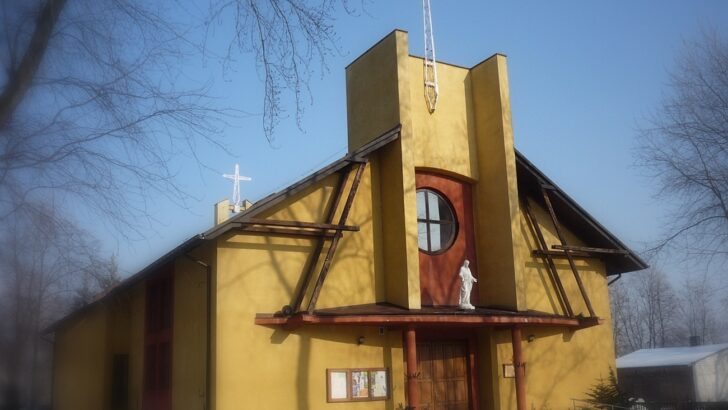In Poland, the Catholic Church is struggling with adversity in society and politics. It is therefore speaking out strongly against the new centre-left government, particularly with regard to its family policy, writes Oliver Hinz
Warsaw (KNA) In January, the priestly profession in Poland often resembles a back-breaking job. Day after day, priests go from house to house in their parishes and visit the faithful. In most cases, the parishes announce exactly when their priests will visit one street and when another. However, fewer and fewer Polish Catholics are happy about the annual pastoral visits, known as “Koleda”. It is not uncommon for them to forego the conversation with the priest and the blessing of their home.
The parish of St Florian in Czestochowa, for example, reported that 44 per cent of families in the place of pilgrimage received the priest at home this year. There are no nationwide statistics. However, Polish media estimate that the average figure is only 30 to 40 per cent.
In recent years, cases of child sexual abuse by clergy and the inadequate handling of these cases have contributed to the church’s significant loss of reputation in Poland’s Catholic heartland. In addition, the closeness of many bishops to the right-wing conservative PiS government in Warsaw, which was voted out of office in October, has caused resentment among many people. In recent surveys, slightly more Poles were satisfied than dissatisfied with the work of the Church.
According to opinion pollsters, the vast majority of people between the Oder and Bug rivers would like the Church to stay out of politics. This is probably why the Bishops’ Conference came up with the strange idea of not saying a word about the outcome of the parliamentary elections and the change of government in December. It neither acknowledged the record voter turnout of 74 per cent nor congratulated Prime Minister Donald Tusk on his inauguration.
However, the Bishops’ Conference’s reticence towards the new centre-left government is over. It has already given Tusk real opposition twice. Firstly, it protested against the state paying for artificial insemination for couples unable to conceive. But the church was unable to persuade President Andrzej Duda to veto the law.
Tusk’s latest plans, the liberalisation of the abortion law and the abolition of the prescription requirement for the “morning-after pill”, were unequivocally condemned by Leszek Gesiak, press spokesman for the Bishops’ Conference: “Under the guise of euphemistic-sounding slogans, these projects will actually lead to the death of people.” That is shocking. It is still unclear whether parliament will approve these two bills. Several members of the coalition apparently want to vote against allowing abortions up to the twelfth week of pregnancy.
The chairman of the Polish Bishops’ Conference has now become even clearer: on Friday, Archbishop Stanislaw Gadecki published a statement against Tusk’s planned liberalisation of the abortion law – even in German: “In the spirit of responsibility for the Church in Poland and for the well-being of our common homeland, I call on all people of good will to speak out unequivocally in favour of life,” said the 74-year-old. Gadecki also appealed to the members of both houses of parliament and to President Duda to “bear witness to a genuine concern for life, which is defenceless because it is unborn”.
Meanwhile, the chairman of the Bishops’ Conference has been criticised by some Catholic publicists and priests for his initiative in favour of two opposition politicians from the right-wing conservative PiS. Both were sentenced to two years in prison for abuse of office and went on hunger strike in prison. “I fully understand the reasons for this dramatic form of protest,” wrote the Archbishop of Poznan to former Interior Minister Mariusz Kaminski and his former deputy Maciej Wasik. He offered to lobby the Minister of Justice Adam Bodnar for their release. “The hunger strike is a form of resistance against what you perceive as radically unjust behaviour by the authorities and a potentially effective means of raising people’s awareness,” added Gadecki.
The Catholic weekly “Tygodnik Powszechny” commented that Gadecki had “clearly sided with the criminals” and justified their actions. She saw this as a political act – and not a humanitarian intervention. However, the chairman of the bishops’ conference had called on both politicians to end the hunger strike. President Duda has since pardoned Kaminski and Wasik, although the Minister of Justice had spoken out against it. According to his spokesman, the archbishop did not take any further steps in the case because the PiS politicians had not responded to his letter.
Meanwhile, there are signs of dialogue between the Bishops’ Conference and the government regarding the reform of church funding. In future, taxpayers will be able to dedicate a certain proportion of their taxes to a religious community. In return, state funds for social insurance for clergy are to be cancelled. An agreement seems possible here. This would certainly be beneficial for future relations between the church and the government.


 Saint Florian church in Częstochowa. Photo: Wikimedia Commons
Saint Florian church in Częstochowa. Photo: Wikimedia Commons 
